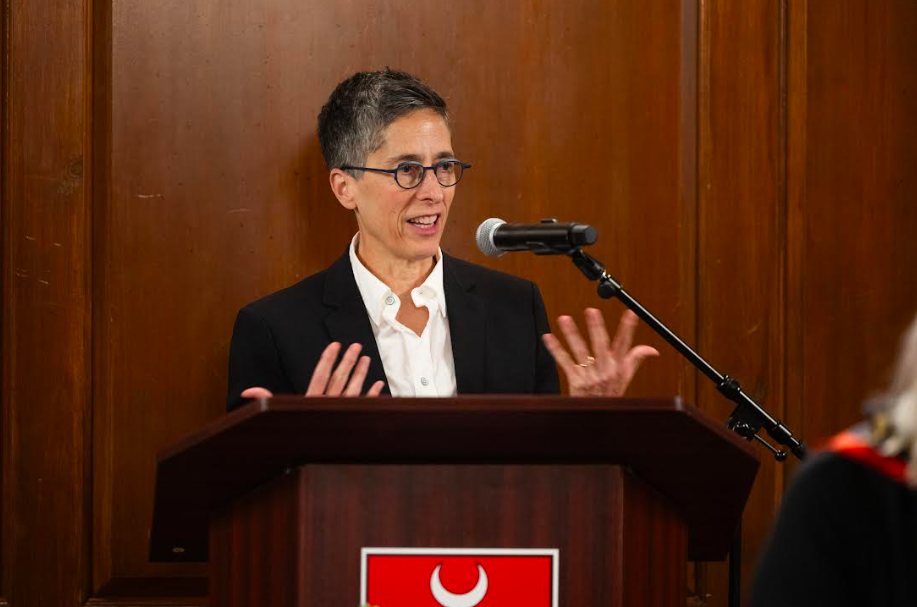Alison Bechdel discusses career and queer identity
The namesake of the renowned “Bechdel Test” talks about what it means to be a lesbian cartoonist.

Courtesy of Alison Bechdel
Alison Bechdel talked about how she “became a lesbian cartoonist” in a lecture this past Wednesday.
Bechdel is a prominent cartoonist, famous for creating the “Bechdel Test” — a gauge of female representation in films based on the criteria that two women must have a conversation about a topic other than men. This semester, she teaches two classes at Yale as a 2024 Chubb Fellow.
“Writers with subjugated identities don’t just have to use their imaginations in the usual way all writers do,” she said. “You have to reimagine. You have to undo and think past the ways they’ve been taught to use themselves.”
In her comics, Bechdel portrays queer life and politics in her works, most notably in her comic strip “Dykes to Watch Out For,” which gave rise to the “Bechdel Test.”
In her lecture, Bechdel discussed her coming to terms with her sexuality as a 19-year-old junior who just transferred to Oberlin College. She recounted her days browsing the campus bookstore and stumbling across a book about homosexuals — their lives and how they realized they were gay.
Showing the audience a comic strip that depicted this moment, Bechdel said, “I was a homosexual, too. It was an actual realization that just suddenly fell into place.”
Bechdel wrote her first autobiographical comic in her 30s, but it took her until she was almost 40 to grapple with the weight of coming out.
Bechdel revealed that her coming out to her parents coincided with her discovery that her father was gay too. Bechdel brought up her graphic memoir, “Fun Home,” where she recalled the story of her father’s suicide — one she referred to as a “political story.”
“[My father] was gay, and I was gay, and he killed himself, and I became a lesbian cartoonist,” she said. “It was so clear that his death was a direct result of the sexual shame and secrecy he had to live with.”
For Bechdel, her sexuality and personal struggles surrounding it are very much political because of how much “certain identities are criminalized and pathologized,” she said.
Her comic strip, “Dykes to Watch Out For,” intertwined lesbian culture and daily life with political commentary.
“Getting out of bed as a lesbian was a political, radical act,” Bechdel said. “I wasn’t addressing the people who thought we didn’t exist or shouldn’t exist, just for us to see ourselves. I wanted to tell the truth about my life.”
Bechdel showed a variety of comic panels on the projector where she touched on political themes in bits of dialogue from her works. Some of the topics included the electoral college, book bannings, assimilation into heteronormative society and conservative lesbians.
By creating one of the first representations of lesbians in popular culture, Bechdel was able to bring queer culture and politics into everyday life.
“I myself discovered Alison’s work at a painful time in my own life, and I know that I am not the only person in this room to have found solace in her remarkable combination of wisdom and wit,” said head of Timothy Dwight College Michal Beth Dinkler.
Dorothy Ha ’28, an attendee of the lecture, praised Bechdel’s lecture, saying that she “liked how conversationally Bechdel was speaking and how she interacted with the audience.” This made Bechdel’s lecture “more engaging,” she said.
The Chubb Fellowship was established in 1949.







